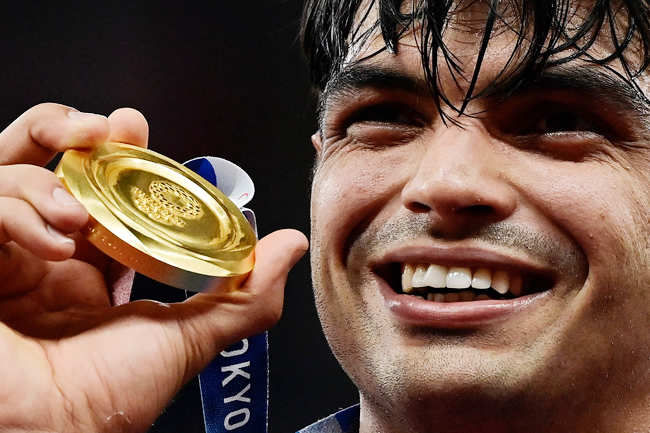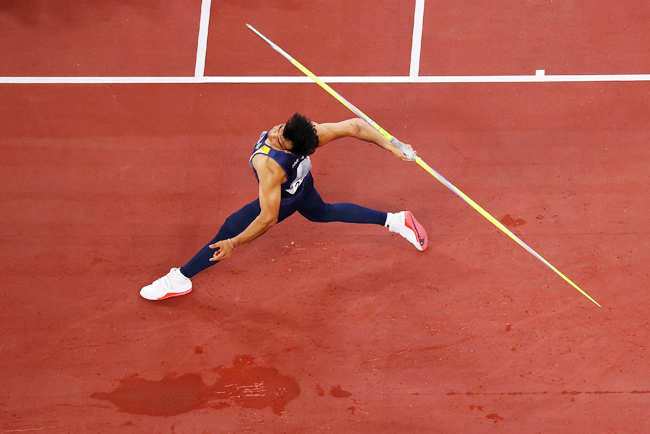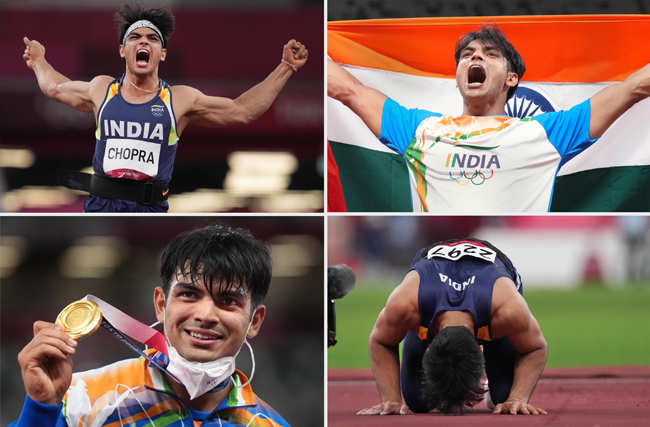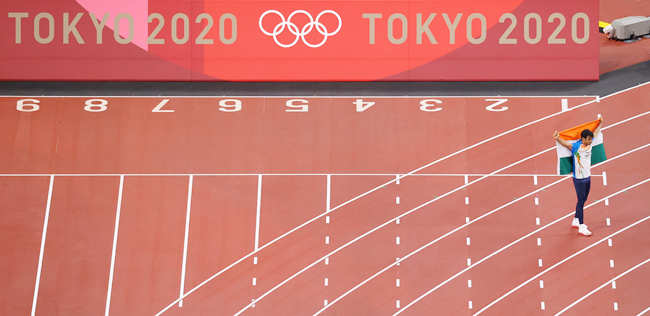
[ad_1]
For the first time in India’s Olympic history, the country has an Olympic gold medallist in athletics.
In Tokyo, after a medal was confirmed, Neeraj kissed the track at the Olympic Stadium. He knew he had done the job for the country. Neeraj took the national tri-colour and went on a much-deserved victory lap.
Neeraj’s gold is the second individual Olympic gold medal won by an Indian athlete, after Abhinav Bindra, and also independent India’s first medal in a track-and-field event.
The newly-crowned Olympic champion Neeraj created history on August 7, a day that will now also be celebrated as National Javelin Day in India.

Neeraj Chopra (AFP Photo)
TimesofIndia.com caught up with Neeraj, the new World No. 2 in the latest rankings (climbing 14 places after his Olympic gold), to talk about his Tokyo experience, joining Abhinav Bindra in a very exclusive club, the Johannes Vetter factor, the transformation from an overweight kid to a champion, his comeback from injury and much more….
How does it feel to be India’s only second individual Olympic gold medallist? What message do you want to give to the fans?
The Olympics is the biggest stage for an athlete and every athlete wants to do well at the Olympics. So, it definitely feels very good. To the fans, I just want to thank them for supporting me and giving me so much encouragement. I am lucky to be representing the country and having the country’s support.
Were you confident that you would seal the deal with your first throw? How did you approach the throws in the final?
My focus in each competition is to do my best and not bother about what else is happening. Javelin is a sport where till the last throw, the result is not decided. That’s how I went about the Olympic finals as well. After my first throw, I knew my body was feeling good and I was throwing well. I wanted to go for the Olympic record because I felt I was in good shape to achieve it.

Neeraj Chopra (Photo credit: Rob Carr/Getty Images)
What is the first thing you will say to Abhinav Bindra when you meet him next?
I have not had the chance to meet him (Abhinav Bindra) as yet. But I would like to thank him for being an inspiration for all us athletes. He proved that Indian athletes can also be the best in the world. His journey showed that with hard work and dedication, anything is possible.
What was the journey to glory in Tokyo like? Talk to us about the training, practice, and the role the coaches have played in your success?
For me, the focus is always to do my best whenever I am on the track. I have had a difficult past two years because I missed most of the 2019 season due to injury and then due to the pandemic. I missed out on 2020 also. So, I was without practice or competition for almost 2 years. My goal was always the Tokyo Olympics. I put in the hard work and trusted the process since every single effort counts when it comes to success at the highest level.
A lot of people have played a massive role in my journey. My coach Dr. Klaus Bartonietz, my physio Ishaan Marwaha have been instrumental and have been of great support. I received support from all corners. I want to thank the Sports Authority of India (SAI) and TOPS, Athletics Federation of India (AFI), Indian Army, and JSW Sports.
You were an overweight kid and the javelin throw journey began by chance. Talk to us about the transformation…
As a child, I was pampered a lot by my family and had become quite overweight. My uncle Bheem Chopra had suggested that I should take up some sport of fitness to lose weight. And, that is how I started my journey. The introduction to javelin happened by chance. When I saw some throwers practicing at the Shivaji Stadium in Panipat, I got the encouragement. Since then, there has been no looking back. I continued playing, liked the sport, so kept at it. As the results started coming, I started liking it more and then started doing well at national, and international competitions.

AFP Photo
It is not easy to make a comeback as you did after an injury and surgery. How did you keep yourself motivated?
It definitely was not easy as I had been away from competition and training for almost 2 whole years. In those times, I just kept myself motivated by focusing on my conditioning, strength, and fitness. I knew that the pandemic situation was the same for everyone, so there was nothing I could do to change it. So, I focused on things I could do myself and which were under my control. I worked hard with my coaches, on my fitness and on certain technical corrections in my throwing. And all of that clicked on the day (Tokyo Olympics final) when I was able to throw the farthest and bring the gold for my country.
How big a role did your coach Klaus Bartonietz play? What were tips from the coach, especially when it came to staying ahead of World No. 1 Johannes Vetter?
My coach is Dr. Klaus Bartonietz. He has guided me a lot. He gave me a lot of confidence. He asked me to focus on myself and work on the angle of release, which is something we had been working on. I was not thinking about Vetter, but about myself and my throw.

Neeraj Chopra (Photo credit: Rob Carr/Getty Images)
Did you have a chat with Johannes Vetter after your gold medal finish?
Vetter is a world-class athlete and is the best javelin thrower in the world right now, by quite some distance. He is regularly throwing above 90m and is very close to breaking the world record. On the day, he was facing some trouble with the track and was unfortunate to miss out. We are good friends and I am always supporting him to do better.
Pakistan also had a thrower in the final -Arshad Nadeem. Did you have any conversation with him?
I don’t speak to him very often, because we have hardly met over the past few years. It feels good to see Arshad do so well because it bodes well for the sport of javelin that Asian countries are doing well. I have been very happy to see Arshad’s performance and hope that his performances spur more athletes from Pakistan to take up javelin throw.
[ad_2]